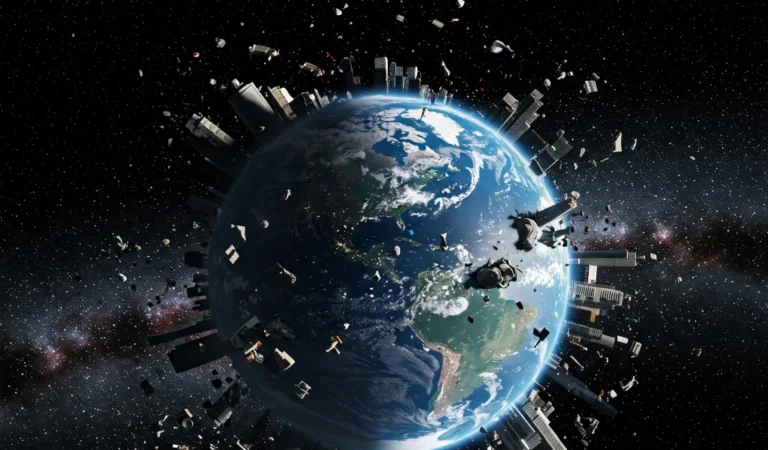Imagine waking up one morning and gravity… is gone.
Your feet lift from the floor. Your coffee floats. So does your dog. The car outside is spinning in midair. Buildings are crumbling. Oceans are rising—not from tides, but because there’s nothing holding them down.
Sounds like science fiction?
Yes. But also a fun and fascinating question: What if gravity could be turned off—like flipping a switch?
Let’s explore what would really happen if gravity vanished for a moment, a day, or forever. From floating chaos to space-bound cities, here’s how the world would change.
🌍 What Exactly Is Gravity?
Before we break the universe, let’s understand how gravity works.
Gravity is the invisible force that pulls everything together. It:
- Keeps your feet on the ground
- Holds the Moon in orbit around Earth
- Keeps Earth orbiting the Sun
- Shapes galaxies
Gravity isn’t just important—it’s essential. It’s woven into the fabric of space and time, as described by Einstein’s theory of General Relativity.
And unlike a light switch, it’s not something we can just flip off… at least not with today’s science.
But let’s imagine we could.
🔄 Scenario 1: Gravity Switches Off for 5 Seconds
Five seconds doesn’t sound like much—but in a gravity-free world, even a short pause can have wild consequences.
Here’s what might happen:
- You float instantly—your body starts rising off the ground.
- Cars, bikes, and buses lose traction and drift upward.
- Water spills from lakes, glasses, and oceans, spreading like mist.
- Birds and planes go into chaotic flight paths.
When gravity suddenly returns, anything midair falls… hard.
That means:
- Serious injuries from falls
- Crashed vehicles and airplanes
- Flooded areas where floating water lands unpredictably
It would be a short, shocking event—causing confusion, damage, and possibly deaths—all in just 5 seconds.
🕒 Scenario 2: Gravity Off for 1 Full Day
Now things get terrifying.
In a full day without gravity, Earth becomes an unrecognizable chaos zone.
Here’s what you’d see:
1. People and Objects Float Away
There’s no force keeping anything grounded. Without protection, people could float miles into the air. Even if you were indoors, walls might collapse as structures fall apart.
2. Atmosphere Escapes
Gravity holds our air in place. Without it, oxygen would slowly rise into space. Breathing becomes difficult within hours.
3. Oceans Lift Off
The seas would rise into the sky as giant floating blobs. Tides, waves, and marine life would spin into the air. Rainfall? Try falling fish and seaweed drifting overhead.
4. Satellites and Space Junk Go Wild
Earth’s orbiting satellites rely on a balance between gravity and momentum. Without gravity, they would fly off into deep space, disrupting GPS, communication, and weather systems.
🏙️ Cities Without Gravity
Imagine a skyscraper built to stay upright… suddenly weightless.
- Buildings would collapse, since their structure depends on weight distribution.
- Elevators would become death traps, shooting upward or dangling midair.
- Fires would spread differently, since smoke and flames rise with heat—but in zero gravity, they float and spread unpredictably.
Even simple tasks—like walking, eating, or drinking—would become impossible without special gear.
🚀 Could We Use It to Escape Earth?
Now, here’s a sci-fi twist.
If gravity turns off… do we all just float into space?
Not immediately. Earth still spins at about 1,000 miles per hour. With gravity gone, objects (including you) would start moving outward—not up, but sideways.
This could launch people, buildings, and water into chaotic paths around the globe—or into orbit, depending on location and speed.
Some may see this as a way to launch spacecraft without fuel. In theory, yes—but the world would be in such disarray that space travel might be the least of our concerns.
🧪 Is Turning Gravity Off Even Possible?
In science, gravity isn’t something you “turn off.” It’s a property of mass. To get rid of gravity, you’d have to remove mass—or somehow cancel its effect, like how magnetic poles can repel each other.
But gravity only attracts. There’s no known way to block it.
Some physicists speculate about exotic matter, quantum gravity fields, or even negative mass. But none of these are anywhere close to reality.
So, for now, “turning off gravity” remains in the realm of science fiction.
But it makes for one heck of a thought experiment.
🧬 How Would Life Adapt in a Zero-Gravity World?
Let’s stretch this out even more.
If Earth lost gravity permanently—and somehow air and warmth were preserved—could life adapt?
In theory:
- Humans would evolve to float and grip better
- Our bones would become weaker, since we no longer need to fight gravity
- Tools and homes would be redesigned to stick to walls, ceilings, or magnetized surfaces
- Food and water would need to be consumed in sealed packets (like astronauts)
Animals would struggle—especially large ones. But small lifeforms might adapt, evolving into new floating species in a weightless world.
🧠 Final Thought: What Would It Feel Like?
Without gravity, you wouldn’t feel weightless—you’d feel directionless.
Your sense of up, down, and balance would disappear. Blood would rush to your head. Your muscles would weaken quickly.
You’d lose track of motion, speed, and time.
People in space report:
- Disorientation
- Nausea
- Weird dreams
- A constant floating sensation
Now imagine billions of people going through that at once.
It would change how we live, think, and survive forever.
🚨 Would It Be a Global Emergency?
Absolutely. Within minutes:
- Power grids fail
- Infrastructure collapses
- Planes and satellites crash
- Global panic sets in
Governments would scramble to communicate, protect citizens, and stabilize the situation—if possible.
Hospitals, police, and rescue teams would be helpless in a floating, structureless world.
📌 Summary: If Gravity Could Be Switched Off…
| Time Without Gravity | Possible Effects |
|---|---|
| 5 Seconds | Floating chaos, falling damage |
| 1 Day | Atmospheric loss, ocean lift, global destruction |
| Forever | Extinction-level event, or a strange new world |
Whether it’s for 5 seconds or forever, gravity is not just a force—it’s the glue that holds our world together.
Turning it off wouldn’t just break the rules of physics. It would unravel life itself.


